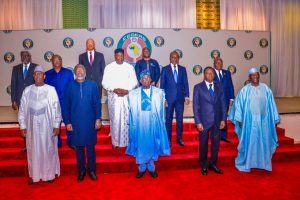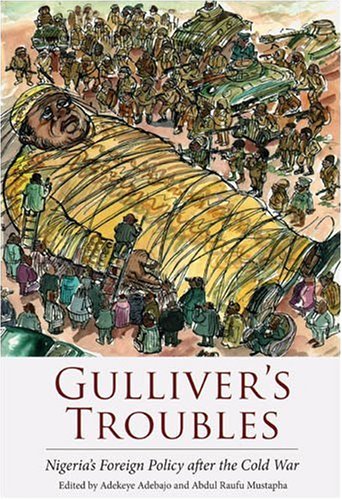The doctrine of ‘news following the flag’ compels the contribution of whoever is in a position to do so towards a sharp course-correction away from what has clearly been a major foreign policy misadventure in Nigeria’s role in the handling of the Niger – Mali – Burkina Faso coups. Doing so is a challenge, given how brilliant foreign policy moves constitutes an unfailing power resource for Nigeria’s self-enactment, at home and abroad.

ECOWAS leaders
The suspension of certain of the ECOWAS sanctions on these countries in Abuja earlier today (Saturday, February 24th, 2024) can be read as the end of Act 1, scene 1 of the saga. It presents an opportunity for President Tinubu to innovate and turn a misadventure into advantages. Which particular populism the president chooses are not for listing in a newspaper. They are completely his own decision but the risks in a wishy-washy handling of the crease are too high not to do so.
But taking note of the gaps in Nigeria’s role in the making of the ECOWAS intended military response to the July coup in Niger Republic should precede the populist innovations that the president would have to consider. It is from appreciation of the gaps that course correction can be healing and transformative. So, what could be the gaps or lessons?
- The handling of the crisis suggests strongly that the engine room of Nigerian foreign policy under the Tinubu administration (wherever or whomever is performing that role) is afflicted by a linear lens. For him or her or them, reality has a straight line from the beginning to the end and there are no intervening variables. Unfortunately, reality is much, much more chaotic and lacking in such an end point as too many instances of reversals makes such teleology impossible.
- It must be well understood that Nigeria’s response to the coup in Niger Republic injured the unwritten but crucial convention in power politics which forbids a hegemon from saying or making certain moves. Now, Nigeria is a hegemon in West Africa. It should have been the unchallenged hegemon in Africa it has managed itself well. As the hegemon in West Africa, Nigeria should not have been heard articulating the possibility of a military response to the coup in Niger Republic. President Tinubu’s rhetoric of zero tolerance for coup after coup in West Africa was surely going to be interpreted differently in many quarters. At worst, such a statement should only have come from a non-descript Nigerian official, not a high state official and, certainly, not the president since no one is higher on the protocol list with the moral or political authority to correct what a president has already put out. Given the ease of embarrassing a hegemon, hegemons either use a proxy or are quiet.
- Nigeria’s stature in ECOWAS makes everyone to attribute even consensus positions of the body to Nigeria’s preference. As such, the option of a military response to the coup in Niger Republic was, rightly or wrongly, loaded on Nigeria. Yet, such a move would have turned international ethnicity up against Nigeria at home, given the ethno-religious and cultural linkages between Nigeria and the three states. The lesson is that current Nigerian foreign policy czars either do not bother about a holistic sense of policy or do not care about such and the implications in that.
- The Nigerian military would have been the backbone of any ECOWAS military response to a coup anywhere in West Africa. The same military has been running a counter-insurgency operation for over a decade. That is in addition to deployment in almost all Nigerian states quelling kidnapping, banditry, secessionist campaigns, herder-farmer violence, cultism, fuel stealing and sundry criminality. Would the same military have been available to add an additional responsibility of routing some coupists in Niger Republic?
- The coup leaders in Niger Republic had quickly and successfully framed the intended military response to the coup in the country as ECOWAS performing slave duty for foreign powers, confronting ECOWAS leaders with a big challenge, given the powerful listenership of foreign radio services across West Africa, particularly the Hausa Services of the BBC, VOA, Radio France International and Radio Deutsche Welle
- The president lost the National Assembly on a military option which was bound to be a largely Nigerian campaign. There is a lesson there in terms of failure to appreciate the different dimensions of diversity at play
- The threat of a military response from ECOWAS must explain why one of the three coup leaders smartly signed a military understanding with Russia. Here again is another problem of linear mindedness: not thinking about other variables that could come into play in the politics of power
- Nigeria did not anticipate the coupists falling back on group narrativisation as anti-imperialist vanguards rescuing their countries from French hegemony. Anti-imperialism is a selling narrative in West Africa any day
- Either as a closely related narrative move or a truly impending plan or even the fertile imagination of the researcher behind it, the story has been circulating that the three juntas are planning a re-enactment of the old Songhai Empire. This leak or ‘rumour’ acquired a lot of attention immediately they served notice of leaving ECOWAS together. Nigerian foreign policy must factor in emotions and memories in how they go about dealing with others
- The juntas carried out the pulling out of their countries from ECOWAS in a manner that caught everyone off guard, offering us a lesson in illimitable options to any hard pressed foreign policy actor in an entangled world.
ECOWAS’ decision to remove some of the sanctions yesterday would, in the light of the foregone, be considered a reasonable course of action to take even as no critical observer is misled into thinking that ECOWAS had any alternatives. Even if the junta leaders begged behind the scene, the refusal to do so openly implies they stand on their extant position, meaning that ECOWAS is basically begging them by lifting the sanctions. That is a turning point ECOWAS leaders must watch because the current set of leaders might not survive the humiliation.
The people in Niger, Mali, B/Faso and Guinea might have been suffering as a result of the sanctions but the leaders have succeeded in convincing them that the suffering is in defence of their dignity and honour.
Meanwhile, the risks in terms of a change in attitude of the affected countries, particularly Niger Republic, are better imagined than mentioned. Much work, therefore, remains to be done and President Tinubu will have no options to borrow practices from the populist rule books to push away the reality of such risks but also the odium of ECOWAS collapsing or weakening terribly when he was the Chairman.
Lastly, it is time for Nigerian foreign policy operatives (or, better, Tinubu’s foreign policy team) to appreciate that the dominant meaning of certain key concepts in international relations have changed for ever. Foreign policy is not the self-contained practice it was a few decades back. Language, psychoanalysis, history and culture have reshaped such time-honoured concepts of sovereignty, national interest, national security, power, war, and all that.




























